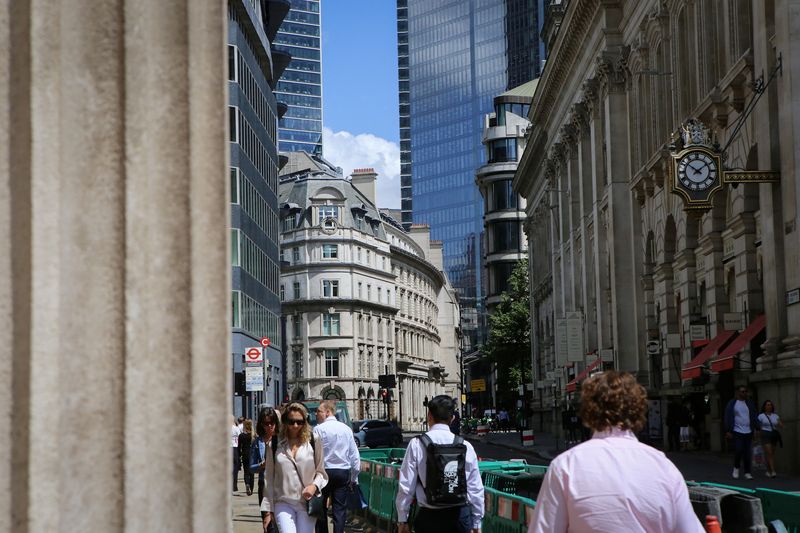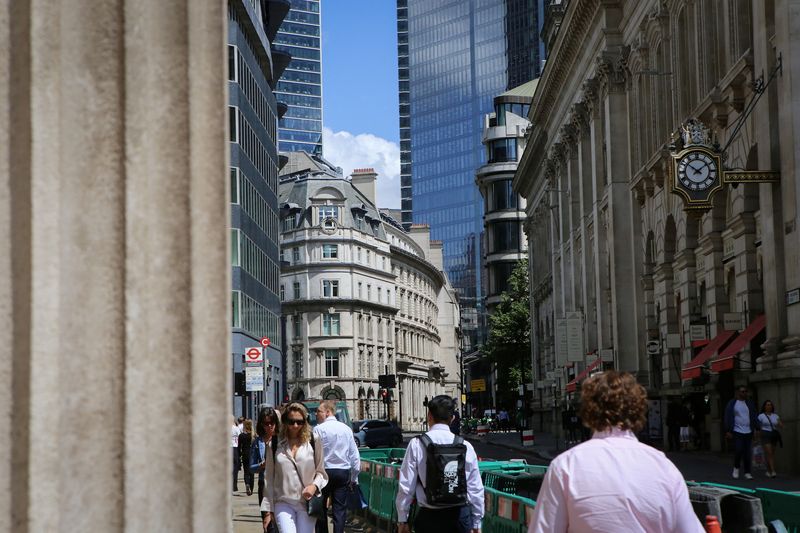Economy
Bank of England forecasts 150 billion pound loss from QE gilt programme


© Reuters. People walk past the Bank of England in London’s financial district, as Britain struggles with the highest inflation rate among the world’s big rich economies, in London, Britain July 17, 2023. REUTERS/Rachel Adams/File Photo
By David Milliken
LONDON (Reuters) – The Bank of England forecast on Tuesday that it would make a net loss of just over 150 billion pounds ($193 billion) over the next 10 years as it unwinds its quantitative easing (QE) gilt purchases, up from 100 billion pounds projected in April.
That loss will need to be funded by the government, at a time when public finances are already under pressure from rising interest rates and inflation, and members of Prime Minister Rishi Sunak’s Conservative Party want tax cuts before a likely 2024 election.
In the short term, the BoE expects the government to pay around 40 billion pounds a year in 2023, 2024 and 2025, roughly 10 billion pounds a year more than its last estimate in April.
Under the terms of the QE programme, which started in 2009 as a means to stimulate the economy after the global financial crisis, Britain’s finance ministry effectively received back the interest payments on government bonds bought by the BoE, but agreed to compensate it for any future losses.
Between 2009 and 2022, the BoE paid the government 124 billion pounds, representing the difference between the interest the BoE received on government bonds it had purchased and the near-zero interest rate it paid on cash deposited by the banks from whom it had bought the bonds.
The BoE forecasts are highly sensitive to changes in financial markets’ interest rate expectations and how fast it sells the 875 billion pounds of British government bonds it bought from 2009 to 2021.
Higher BoE rates reduce the market value of the gilts it holds and increase the interest it pays to banks, which has risen from 0.1% in December 2021 to 5% as of June.
Markets currently expect BoE rates to peak at 5.75% later this year, up from around 5% at the time of April’s report.
Last year two former BoE deputy governors suggested the BoE and the government should consider stopping paying interest on some of banks’ holdings with the BoE, but this was rejected by BoE Governor Andrew Bailey.
So far the BoE has reduced its gilt holdings to just over 800 billion pounds through a mix of outright sales and not reinvesting the proceeds of maturing gilts.
The BoE projections assume holdings continue to fall at their current target rate of 80 billion pounds a year.
Under a separate scenario, where interest rates settle back in line with a 2018 BoE estimate of their equilibrium level of 2-3% – which is lower than markets expect – losses are reduced to just over 100 billion pounds. That is still more than 50 billion pounds greater than forecast in April.
($1 = 0.7792 pounds)
Economy
Russian central bank says it needs months to make sure CPI falling before rate cuts -RBC


© Reuters. Russian Central Bank Governor Elvira Nabiullina attends a news conference in Moscow, Russia June 14, 2019. REUTERS/Shamil Zhumatov/File Photo
MOSCOW (Reuters) – Russia’s central bank will need two to three months to make sure that inflation is steadily declining before taking any decision on interest rate cuts, the bank’s governor Elvira Nabiullina told RBC media on Sunday.
The central bank raised its key interest rate by 100 basis points to 16% earlier in December, hiking for the fifth consecutive meeting in response to stubborn inflation, and suggested that its tightening cycle was nearly over.
Nabiullina said it was not yet clear when exactly the regulator would start cutting rates, however.
“We really need to make sure that inflation is steadily decreasing, that these are not one-off factors that can affect the rate of price growth in a particular month,” she said.
Nabiullina said the bank was taking into account a wide range of indicators but primarily those that “characterize the stability of inflation”.
“This will take two or three months or more – it depends on how much the wide range of indicators that characterize sustainable inflation declines,” she said.
The bank will next convene to set its benchmark rate on Feb. 16.
The governor also said the bank should have started monetary policy tightening earlier than in July, when it embarked on the rate-hiking cycle.
Economy
China identifies second set of projects in $140 billion spending plan


© Reuters. FILE PHOTO: Workers walk past an under-construction area with completed office towers in the background, in Shenzhen’s Qianhai new district, Guangdong province, China August 25, 2023. REUTERS/David Kirton/File Photo
SHANGHAI (Reuters) – China’s top planning body said on Saturday it had identified a second batch of public investment projects, including flood control and disaster relief programmes, under a bond issuance and investment plan announced in October to boost the economy.
With the latest tranche, China has now earmarked more than 800 billion yuan of its 1 trillion yuan ($140 billion) in additional government bond issuance in the fourth quarter, as it focuses on fiscal steps to shore up the flagging economy.
The National Development and Reform Commission (NDRC) said in a statement on Saturday it had identified 9,600 projects with planned investment of more than 560 billion yuan.
China’s economy, the world’s second largest, is struggling to regain its footing post-COVID-19 as policymakers grapple with tepid consumer demand, weak exports, falling foreign investment and a deepening real estate crisis.
The 1 trillion yuan in additional bond issuance will widen China’s 2023 budget deficit ratio to around 3.8 percent from 3 percent, the state-run Xinhua news agency has said.
“Construction of the projects will improve China’s flood control system, emergency response mechanism and disaster relief capabilities, and better protect people’s lives and property, so it is very significant,” the NDRC said.
The agency said it will coordinate with other government bodies to make sure that funds are allocated speedily for investment and that high standards of quality are maintained in project construction.
($1 = 7.1315 renminbi)
Economy
Russian central bank says it needs months to make sure CPI falling before rate cuts -RBC


© Reuters. Russian Central Bank Governor Elvira Nabiullina attends a news conference in Moscow, Russia June 14, 2019. REUTERS/Shamil Zhumatov/File Photo
MOSCOW (Reuters) – Russia’s central bank will need two to three months to make sure that inflation is steadily declining before taking any decision on interest rate cuts, the bank’s governor Elvira Nabiullina told RBC media on Sunday.
The central bank raised its key interest rate by 100 basis points to 16% earlier in December, hiking for the fifth consecutive meeting in response to stubborn inflation, and suggested that its tightening cycle was nearly over.
Nabiullina said it was not yet clear when exactly the regulator would start cutting rates, however.
“We really need to make sure that inflation is steadily decreasing, that these are not one-off factors that can affect the rate of price growth in a particular month,” she said.
Nabiullina said the bank was taking into account a wide range of indicators but primarily those that “characterize the stability of inflation”.
“This will take two or three months or more – it depends on how much the wide range of indicators that characterize sustainable inflation declines,” she said.
The bank will next convene to set its benchmark rate on Feb. 16.
The governor also said the bank should have started monetary policy tightening earlier than in July, when it embarked on the rate-hiking cycle.

 Forex4 years ago
Forex4 years agoForex Today: the dollar is gaining strength amid gloomy sentiment at the start of the Fed’s week

 Forex3 years ago
Forex3 years agoUnbiased review of Pocket Option broker

 Forex3 years ago
Forex3 years agoDollar to pound sterling exchange rate today: Pound plummeted to its lowest since 1985

 Forex3 years ago
Forex3 years agoHow is the Australian dollar doing today?

 Cryptocurrency3 years ago
Cryptocurrency3 years agoWhat happened in the crypto market – current events today

 World3 years ago
World3 years agoWhy are modern video games an art form?

 Commodities3 years ago
Commodities3 years agoCopper continues to fall in price on expectations of lower demand in China

 Economy3 years ago
Economy3 years agoCrude oil tankers double in price due to EU anti-Russian sanctions

























